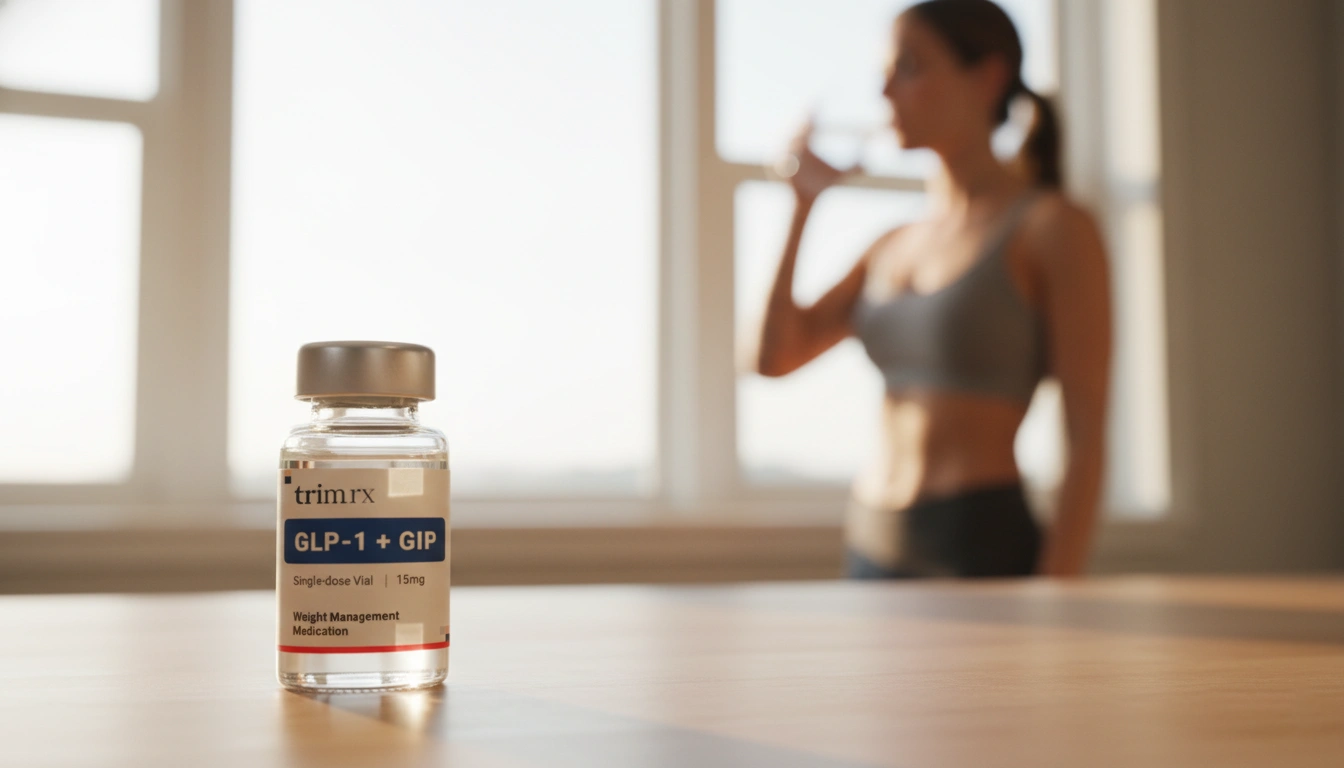Why Do GLP-1 Medications Cause Constipation?

The journey to better health can be filled with unexpected hurdles. One such hurdle that many individuals experience when taking GLP-1 (Glucagon-Like Peptide-1) medications is constipation. For those who are considering or currently using these medications for weight loss or diabetes management, understanding the relationship between GLP-1 medications and constipation is essential. Why does this side effect occur, and what can be done to alleviate it? In this blog post, we will explore the reasons behind constipation caused by GLP-1 medications and discuss practical strategies to manage this common side effect.
Introduction
Constipation, often characterized by infrequent or difficult bowel movements, affects millions of people worldwide. It can be particularly frustrating for individuals taking GLP-1 medications, which have been celebrated for their efficacy in managing blood sugar levels and promoting weight loss. Research indicates that about 5% of patients taking GLP-1 medications report experiencing constipation. This statistic highlights the importance of understanding the underlying mechanisms that contribute to this uncomfortable side effect.
The purpose of this blog post is to provide a comprehensive look at why GLP-1 medications cause constipation, the physiological processes involved, and actionable strategies to manage this issue effectively. By the end of this article, we aim to empower you with knowledge and practical solutions that can enhance your experience on GLP-1 medications while promoting overall digestive health.
We’ll cover the following key areas:
- Understanding GLP-1 Medications: What they are and how they work.
- The Mechanism Behind Constipation: Exploring how GLP-1 medications affect the digestive system.
- Common Symptoms of Constipation: Identifying the signs to watch for.
- Strategies to Manage Constipation: Practical tips and lifestyle changes to alleviate symptoms.
- When to Consult a Healthcare Provider: Understanding when professional guidance is needed.
Together, we will delve into the science and practicalities of managing constipation while benefiting from GLP-1 medications.
Understanding GLP-1 Medications
GLP-1 medications are a class of drugs that mimic the effects of the naturally occurring hormone glucagon-like peptide-1. This hormone plays a critical role in regulating insulin secretion, controlling blood sugar levels, and promoting satiety after meals. GLP-1 medications, such as Semaglutide (Ozempic® and Wegovy®) and Tirzepatide (Mounjaro®), have gained popularity for their dual benefits of weight loss and diabetes management.
How GLP-1 Medications Work
When we consume food, GLP-1 is released from the intestines, signaling the pancreas to release insulin and reduce glucagon production. This process lowers blood sugar levels and enhances feelings of fullness. Additionally, GLP-1 medications slow gastric emptying, which prolongs the time food spends in the stomach. While this mechanism is beneficial for managing appetite and blood sugar, it can also lead to delayed digestion and gastrointestinal side effects, including constipation.
The Benefits of GLP-1 Medications
At TrimRx, we are committed to providing personalized weight loss solutions that harness the power of GLP-1 medications. Our medically supervised programs are designed to help individuals achieve sustainable weight loss while managing their overall health. With a focus on empathy and individualized care, we aim to support you on your journey to better health. If you’re interested in exploring our personalized weight loss programs, we encourage you to take our free assessment quiz to determine your eligibility for prescription medications.
The Mechanism Behind Constipation
Understanding why GLP-1 medications can cause constipation requires a closer look at how these drugs interact with the gastrointestinal system.
Slowed Gastric Emptying
One of the primary effects of GLP-1 medications is the slowing of gastric emptying. This means that food remains in the stomach longer, leading to a prolonged sensation of fullness. While this can aid in weight management by reducing overall calorie intake, it can also result in slower movement of food through the intestines. This delayed transit time can lead to harder stools, as the longer food stays in the intestines, the more water is absorbed, resulting in drier and harder stools that are more difficult to pass.
Reduced Peristaltic Activity
GLP-1 medications can also affect the peristaltic activity of the intestines—the coordinated contractions that move food through the digestive tract. By impacting the nervous system’s ability to stimulate these contractions, GLP-1 medications can reduce the frequency and effectiveness of bowel movements, exacerbating constipation.
Decreased Dietary Fiber Intake
Another factor contributing to constipation is the potential decrease in dietary fiber intake. As GLP-1 medications promote feelings of satiety, individuals may find themselves eating less overall, which could lead to a lower intake of fiber-rich foods. Fiber is crucial for maintaining regular bowel movements, as it adds bulk to the stool and helps it move through the intestines.
Dose Dependency
Interestingly, the severity of constipation may be dose-dependent. Higher doses of GLP-1 medications have been associated with an increased incidence of gastrointestinal side effects, including constipation. If you are taking a higher dose and experiencing constipation, discussing potential adjustments with your healthcare provider may be beneficial.
Common Symptoms of Constipation
Recognizing the signs of constipation is essential for effective management. Common symptoms include:
- Infrequent bowel movements (typically fewer than three times a week)
- Hard or lumpy stools
- Straining during bowel movements
- A feeling of incomplete evacuation
- Abdominal discomfort or bloating
If you experience any of these symptoms while on GLP-1 medications, it’s important to take proactive steps to address them.
Strategies to Manage Constipation
Fortunately, there are several strategies you can implement to help alleviate constipation while taking GLP-1 medications. Here are some actionable tips:
1. Stay Hydrated
Hydration plays a vital role in maintaining regular bowel movements. Water helps soften stool and keeps the digestive system functioning smoothly. Aim for at least 8-10 cups of water daily, adjusting based on your activity level and climate. Keeping a reusable water bottle on hand can serve as a reminder to drink throughout the day.
2. Increase Dietary Fiber Intake
A diet rich in fiber is key to preventing constipation. Aim for a daily intake of 25-35 grams of fiber from sources such as fruits, vegetables, whole grains, and legumes. Foods like beans, lentils, oats, and chia seeds are excellent sources of fiber that can help promote bowel regularity. Consider adding a fiber supplement, such as psyllium husk, if you’re struggling to meet your fiber goals through food alone.
3. Engage in Regular Physical Activity
Exercise stimulates the muscles in your digestive tract, promoting more effective bowel movements. Aim for at least 150 minutes of moderate-intensity exercise per week, which can include activities like brisk walking, swimming, or yoga. Incorporating strength-training exercises on two or more days a week can further enhance your overall health.
4. Monitor Medication Dosage
If you’re experiencing significant constipation, it may be worth discussing your medication dosage with your healthcare provider. They may recommend adjusting your dose or considering alternative treatment options that can better suit your needs.
5. Try Natural Remedies
Certain natural remedies, such as prunes or prune juice, are known for their laxative effects and can help promote regular bowel movements. Additionally, incorporating probiotics or fermented foods into your diet may improve gut health and digestive function.
6. Consult Your Healthcare Provider
If constipation persists despite implementing these strategies, it’s crucial to consult your healthcare provider for personalized guidance. They can recommend safe over-the-counter laxatives or other treatments that can help alleviate your symptoms.
When to Consult a Healthcare Provider
While constipation can often be managed with lifestyle changes and home remedies, there are certain situations in which you should seek medical advice:
- If constipation lasts longer than a few weeks or becomes severe.
- If you experience significant abdominal pain, bloating, or discomfort.
- If you notice any blood in your stool or experience unexplained weight loss.
- If your constipation is accompanied by other concerning symptoms, such as nausea or vomiting.
Your healthcare provider can provide personalized recommendations and adjustments to your treatment plan to ensure your overall health and well-being.
Conclusion
Navigating the path to weight loss and improved health with GLP-1 medications can be a rewarding journey. However, it’s essential to be aware of potential side effects, such as constipation, and take proactive measures to manage them. By understanding the mechanisms behind constipation and implementing practical strategies, you can enhance your experience with GLP-1 medications and maintain your digestive health.
At TrimRx, we are dedicated to providing personalized support and solutions that prioritize your well-being. If you’re interested in exploring our weight loss programs or have questions about GLP-1 medications, we encourage you to take our free assessment quiz to determine your eligibility for prescription medications. Together, we can work towards achieving your health goals while managing any challenges that may arise.
FAQ
Can GLP-1 medications cause other gastrointestinal side effects?
Yes, GLP-1 medications can cause a range of gastrointestinal side effects, including nausea, vomiting, and diarrhea, in addition to constipation.
How long does constipation last while taking GLP-1 medications?
The duration of constipation can vary, but it may persist for several weeks. If you experience prolonged symptoms, consult your healthcare provider.
Are there specific foods I should avoid to reduce constipation?
While everyone is different, some individuals may find that high-fat or processed foods exacerbate constipation. Focus on a balanced diet rich in fiber and hydration.
Can I continue taking GLP-1 medications if I experience constipation?
Many people can manage constipation effectively while continuing their GLP-1 medications. However, if symptoms become severe, consult your healthcare provider for guidance.
Are there any long-term risks associated with constipation from GLP-1 medications?
Chronic constipation can lead to complications such as bowel obstruction if left untreated. It’s important to address symptoms promptly and maintain open communication with your healthcare provider.
By understanding the connection between GLP-1 medications and constipation, you can take informed steps to ensure a smoother and more comfortable health journey. Together, let’s embrace the potential of these medications while prioritizing your digestive well-being.

Transforming Lives, One Step at a Time
Keep reading
Vitamin B12 and GLP-1 Medications: What to Know
GLP-1 medications can lower B12 absorption and intake; learn symptoms, food sources, supplement options, and how to monitor levels.
Semaglutide Injection Site Reactions: What To Know
Learn why semaglutide injections can cause redness, swelling or nodules, how to prevent and treat them, and when to seek medical care.
TrimRx vs Friday’s
Compare TrimRx and Friday’s telehealth GLP-1 weight-loss programs: pricing, medical support, coaching, delivery, and which fits your needs.



